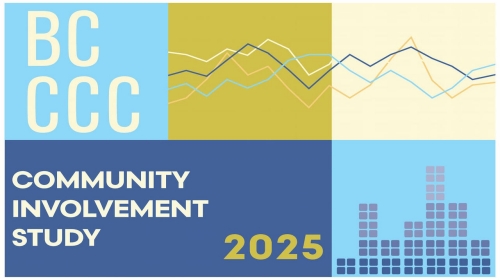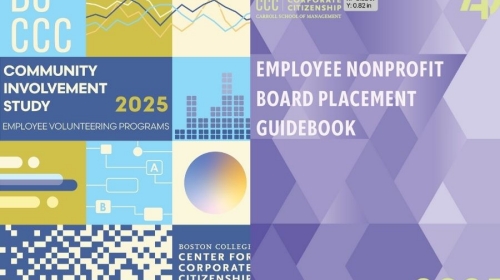WEBINAR: This webinar explores how to measure and communicate your organization's social impact with proven frameworks and strategies that matter to stakeholders.
The new, new world…

“To survive and flourish in such a world, you will need a lot of mental flexibility and great reserves of emotional balance. You will have to repeatedly let go of some of what you know best, and feel at home with the unknown.”
― Yuval Noah Harari, 21 Lessons for the 21st Century
For those of you who don’t know me, I have been called a master of understatement. As such I’d like to open by saying that the disruption we are experiencing with COVID-19 is uncharted territory. The Boston College Center for Corporate Citizenship was slated to run our large annual conference at the end of this month in San Francisco. We have been responding on the fly to a constant stream of evolving (sometimes conflicting) advice and feedback. I would be remiss if I did not acknowledge and thank our members, conference sponsors, affinity groups, and our excellent team for the most exemplary way in which they have rolled with the punches, showed their support for BCCCC, and maintained their commitment to our mission. THANK YOU! (click here to see an impressive list of actions that our members have taken to support their communities during this crisis).
For those of you who don’t know us, corporate citizenship is described as how a company exercises its rights, responsibilities, obligations, and privileges within society. The idea of the purpose-driven corporation has existed since the beginning of the corporation but recently—in the last year especially—business leaders have developed a renewed focus on environmental, social, and governance (ESG) aspects of business that serve both the bottom line and also broader society. At the Center for Corporate Citizenship, our role is to help corporate citizenship professionals create the greatest possible business value for their companies and the greatest possible social value with the investments they make through their programs. Though our CSR colleagues likely don’t control all of their firms’ corporate citizenship, they are often the initiators of important conversations about how this can achieved.
There is a great deal that we will learn over the coming weeks and months about how that will play out in this particular situation. We do know some things, however, about how value is created.
Though we are covering new ground, we do know that much of the value in companies is derived from intangibles, which are determined by our relationships and will be exceedingly important to our ability to survive and thrive. The Business Roundtable issued an extensive statement on this topic back in Q3 of 2019. Though it feels like a hundred years ago, this letter offers useful perspective today. I wrote about this back in September, but here’s the nutshell version: The order in which the Round Table lists the stakeholders to be considered is not an accident (customers, employees, suppliers, communities, finally… shareholders). I think we can apply it as a kind of order of operations for how we think through our commitments in this moment.
((Customers X employees) suppliers / communities) + investors = value
If there was ever a time that we needed to apply systems thinking (and apply this as an order of operations) to consider all stakeholders, it is now. Here are the stakeholders identified by the BRT signatories and corporate citizenship questions we can consider for each group as we move forward:
“Delivering value to our customers. We will further the tradition of American companies leading the way in meeting or exceeding customer expectations.”
How are we communicating to customers and accommodating them in this moment? Have we honored commitments, forgiven fees? Are we doing all that we can to keep them safe? Can we point them to important information or resources in our communities?
“Investing in our employees. This starts with compensating them fairly and providing important benefits. It also includes supporting them through training and education that help develop new skills for a rapidly changing world. We foster diversity and inclusion, dignity and respect.”
Are we doing all we can to support employees as we ask them to work differently? If we have an employee relief fund, are we prepared for how we will support employees through school closures or other disruptions? Have we adopted adequate sick leave policies?
“Dealing fairly and ethically with our suppliers. We are dedicated to serving as good partners to the other companies, large and small, that help us meet our missions.”
Are we making sure that our suppliers are protecting workers by keeping adequate human rights and safety protections in place? Are we promoting and sharing the best practices we have learned and making sure that our customers understand that disease is not the fault of particular nations or ethnic groups?
“Supporting the communities in which we work. We respect the people in our communities and protect the environment by embracing sustainable practices across our businesses.”
Are we doing all we can to make sure that our communities are strong and healthy? Are we supporting the organizations and institutions on the front line to the best of our ability? What more can we do? If we can’t give money at this time, are there other things we can do such as gifts in kind or pro bono support?
“Generating long-term value for shareholders, who provide the capital that allows companies to invest, grow and innovate. We are committed to transparency and effective engagement with shareholders.”
I’m leaving this one to the experts…who are all over the place right now. Here is what empirical research suggests: In times of extreme crisis and volatility like this: 1.) Companies with strong corporate citizenship may benefit from insurance-like protections, and; 2.) are better able to regain and hold value. They also are more likely to be able keep and attract the talent that they need.
More to learn and more to come. While many of us are experiencing social distancing, we will be upping our communication a bit to keep you informed of how the practice is unfolding as we move forward through this crisis. Let us know if there is something that you’d like to know more about. We’ll do our best. This is a time to think about sustainable business. How we move forward flexibly and sustain business in this new, new world will teach us about navigating the unknown and possibly accelerate how we learn from each other. Here is a list of what our member companies are doing in response to the COVID-19 crisis. Let the learning begin!
Related Content
RESEARCH BRIEF - Researchers investigated how ESG activities help or hurt financial performance, using nine years of data from over 1,200 global companies.
RESEARCH BRIEF - Researchers analyzed 4 US energy exchange-traded funds (ETFs) over 15 years, including 2 dirty energy funds tracking fossil fuel companies and 2 clean energy funds tracking renewable energy companies.
RESEARCH BRIEF - Researchers conducted a survey, which measured perceptions of CSR and ethical leadership within the manufacturing and service industries.
WEBINAR: This webinar explores how corporate giving will be reshaped by the One Big Beautiful Bill. Hear directly from corporate citizenship leaders as they share innovative, real-world strategies that deliver impact for communities and results for business.
This study explores shifting trends in employee volunteering, corporate giving, and other means of corporate community involvement.
This guidebook offers insights on placing employees in nonprofit board service roles.
This study explores shifting trends in employee volunteering, corporate giving, and other means of corporate community involvement.








